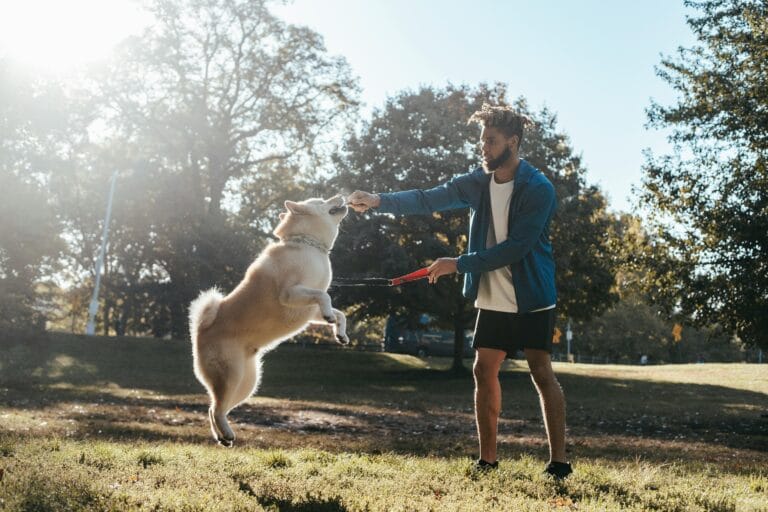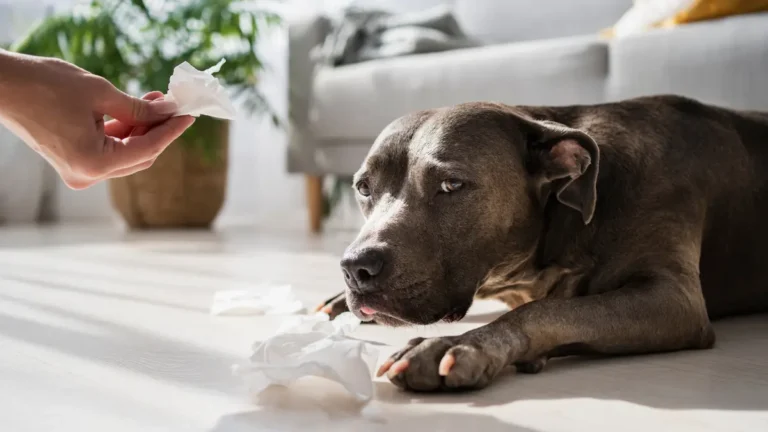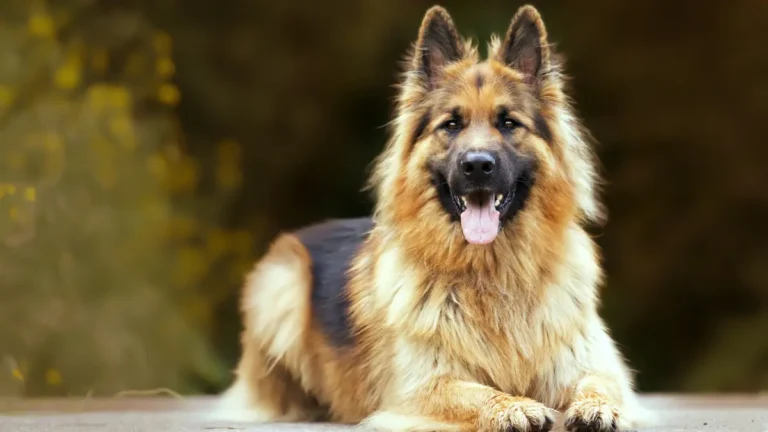Table of Contents
Golden retriever puppies are one of the most beloved dog breeds worldwide. Known for their friendly nature, loyalty, and playful energy, they make excellent family pets. Whether you’re welcoming a golden retriever puppy into your home for the first time or looking for tips to raise them right, this guide will walk you through all the essential steps. From understanding their history to mastering training techniques and ensuring their health, you’ll find everything you need to raise a happy, healthy puppy.
History and Origin of golden retriever puppies
Golden retriever puppies come from a proud lineage, initially bred in the Scottish Highlands during the 19th century. The goal was to create a dog capable of retrieving games from both land and water, and the golden retriever quickly became a favorite for hunters. Developed by crossing the Yellow Retriever with the Tweed Water Spaniel (now extinct), golden retrievers have since grown into one of the most popular breeds worldwide—not just for hunting, but as loyal companions and working dogs.
Physical Traits of golden retriever puppies
Golden retriever puppies are famous for their fluffy, soft coats, which range in color from light cream to rich golden hues. Their floppy ears and expressive eyes make them irresistible, and as they grow, they develop strong, muscular builds. Their coats will thicken and become more water-resistant as they mature, and adult males typically weigh between 65 to 75 pounds, while females are slightly smaller, averaging 55 to 65 pounds.
Watching golden retriever puppies grow from adorable balls of fluff into strong, energetic adults is one of the most rewarding aspects of owning them. As they develop, their physical traits become more defined, showcasing the classic look of the breed.
Personality and Temperament
Golden retriever puppies are known for their friendly, affectionate nature. From an early age, they are eager to please, making them excellent companions for families, especially those with children. They are intelligent and easy to train, which is why many golden retrievers are used as service dogs or therapy animals.
However, golden retriever puppies are also incredibly energetic and need plenty of physical and mental stimulation to stay happy. Without proper exercise and engagement, they can become bored and may start chewing on furniture or digging in the yard. But with consistent training and attention, they grow into calm, well-behaved dogs.
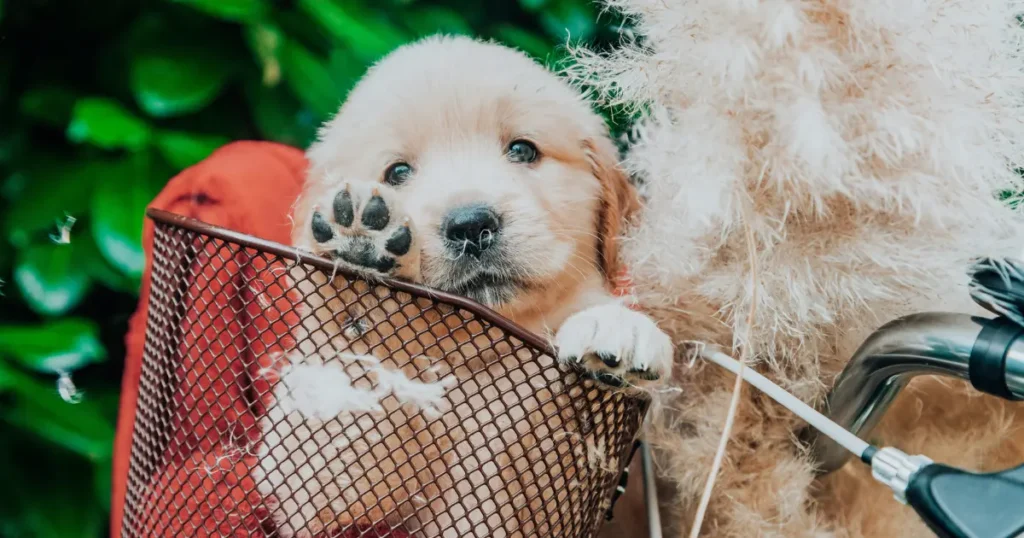
Preparing Your Home for a golden retriever puppy
Before bringing your golden retriever puppy home, it’s crucial to ensure your house is safe and ready for their curious exploration. Golden retriever puppies are naturally inquisitive and will want to investigate every corner of their new environment. To keep them safe, remove potential hazards like electrical cords, small objects they could swallow, and any toxic plants.
You’ll also need to gather essential supplies to help your golden retriever puppy settle in comfortably. Make sure you have:
- A cozy dog bed
- Puppy-safe chew toys
- Stainless steel food and water bowls
- A sturdy collar and leash
- Grooming tools like brushes and nail clippers
- High-quality puppy food
With a safe, prepared environment, your golden retriever puppy will feel at home in no time.
Training golden retriever puppies
Golden retriever puppies are quick learners, but training should start as soon as they arrive home. House training is one of the first things you’ll need to tackle. Since golden retriever puppies have small bladders, it’s important to take them outside frequently, especially after meals and naps. Establishing a routine will help them learn faster.
Basic Commands
Golden retriever puppies are highly motivated by food and praise, making them easy to train using positive reinforcement. Start with simple commands like “sit,” “stay,” “come,” and “leave it.” Keep training sessions short and fun to hold their attention and avoid frustration.
Socialization
Socializing your golden retriever puppy is key to raising a well-adjusted adult dog. Expose them to different people, environments, and experiences early on to build their confidence. Regularly meeting other dogs and animals will also help prevent behavioral issues later in life.
Feeding and Nutrition
The diet you provide for golden retriever puppies will have a lasting impact on their growth and development. They require high-quality puppy food that supports their rapid growth. Since golden retrievers are prone to obesity, it’s essential to monitor their portions and avoid overfeeding.
Feeding Schedule
Golden retriever puppies should be fed three to four times a day until they are about six months old. After that, you can reduce their meals to twice a day. Be sure to provide clean, fresh water at all times, as golden retrievers are an active breed and need plenty of hydration.
Foods to Avoid
Some human foods are toxic to golden retriever puppies, so it’s important to keep harmful items like chocolate, grapes, raisins, onions, and macadamia nuts far out of reach. Stick to feeding them high-quality dog food specifically formulated for puppies to ensure they get the right nutrients.
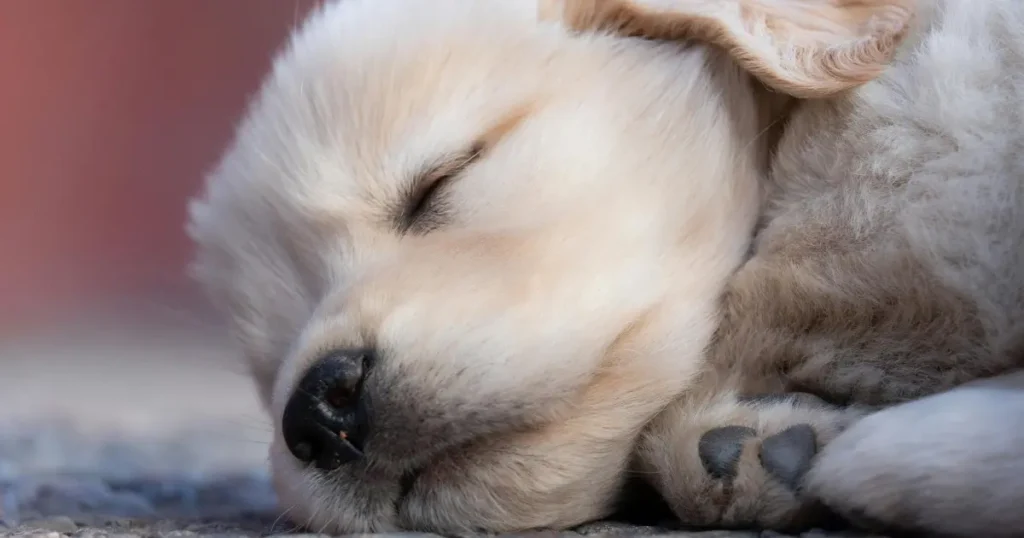
Grooming golden retriever puppies
Golden retriever puppies have thick coats that require regular grooming to keep them healthy and shiny. Their fur sheds heavily, especially during certain times of the year, so it’s important to develop a good grooming routine early.
Brushing and Bathing
Brushing your golden retriever puppy two to three times a week helps prevent mats and tangles while reducing shedding. You’ll also need to bathe them occasionally, particularly if they’ve gotten muddy or spent time outdoors. Use a gentle, dog-specific shampoo to keep their coat clean without irritating their sensitive skin.
Nail Care and Ear Cleaning
Golden retriever puppies need regular nail trimming to prevent discomfort and injury. Their floppy ears are also prone to infections, so it’s important to check and clean them regularly to keep them healthy.
Exercise and Playtime
Golden retriever puppies are full of energy and require plenty of physical activity to stay happy. Exercise is not only crucial for their physical health but also helps burn off excess energy, preventing boredom and destructive behavior.
Daily Walks and Play
Your golden retriever puppy will benefit from daily walks and play sessions. However, because their joints are still developing, be careful not to over-exercise them in their early months. Games like fetch, tug-of-war, and gentle running are great ways to keep them active.
Additionally, introducing engaging toys can make playtime even more fun and stimulating. Check out this amazing guide on dog toys to find the perfect toys that can entertain and challenge your pup, keeping their mind sharp and energy well-spent.
Mental Stimulation
In addition to physical exercise, golden retriever puppies need mental challenges to stay engaged. Puzzle toys, interactive games, and training sessions are excellent ways to keep their minds sharp and prevent boredom.
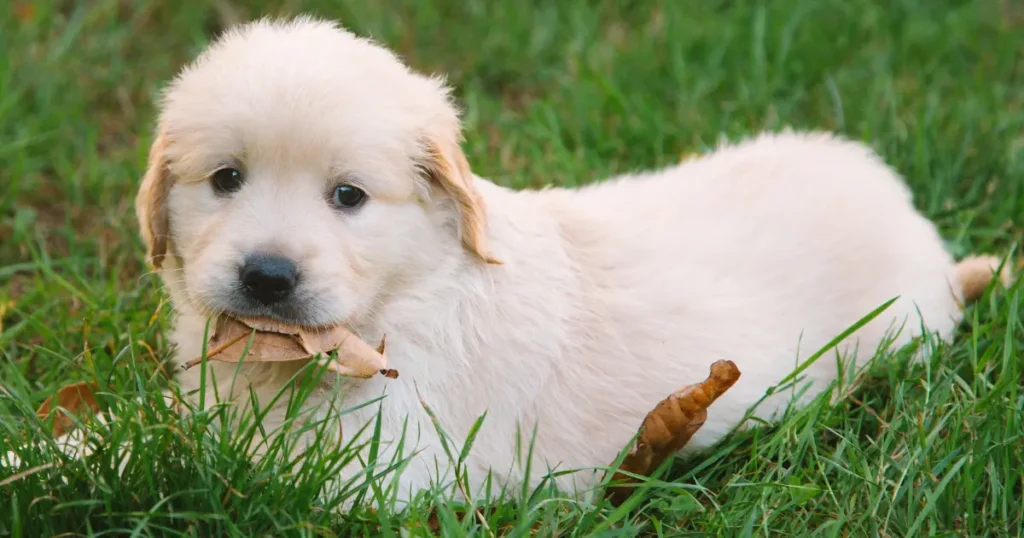
Health Concerns for golden retriever puppies
Like all dog breeds, golden retriever puppies can be prone to certain health issues. It’s important to monitor their health closely and provide regular vet care to catch any problems early.
Common Health Issues
Golden retriever puppies are particularly susceptible to hip dysplasia, elbow dysplasia, and heart problems. Choosing a reputable breeder who screens for these conditions can reduce the likelihood of your puppy developing them. Regular vet checkups and a proper diet will also help keep them healthy.
Vaccinations and Vet Visits
Ensure that your golden retriever puppy is up to date on vaccinations to protect them from dangerous diseases like distemper, parvovirus, and rabies. Regular vet visits are also essential for tracking their growth and overall health.
Developmental Stages
Golden retriever puppies go through several developmental stages as they grow, each with its own unique challenges and milestones.
Early Puppyhood (0-8 Weeks)
During the first eight weeks of life, golden retriever puppies rely heavily on their mother and littermates for nourishment and social development. Breeders typically keep puppies with their mothers until they are at least eight weeks old, ensuring they are ready to be independent.
Socialization Stage (8-16 Weeks)
From 8 to 16 weeks, golden retriever puppies enter a critical period for socialization. This is the best time to introduce them to new environments, people, and other animals. It’s also the ideal time to start training basic commands and house training.
Adolescence (6-18 Months)
Golden retriever puppies can be a bit challenging during adolescence, as they begin to test boundaries and explore their independence. This is a crucial time for consistent training and reinforcement of good behavior to ensure they grow into well-mannered adults.
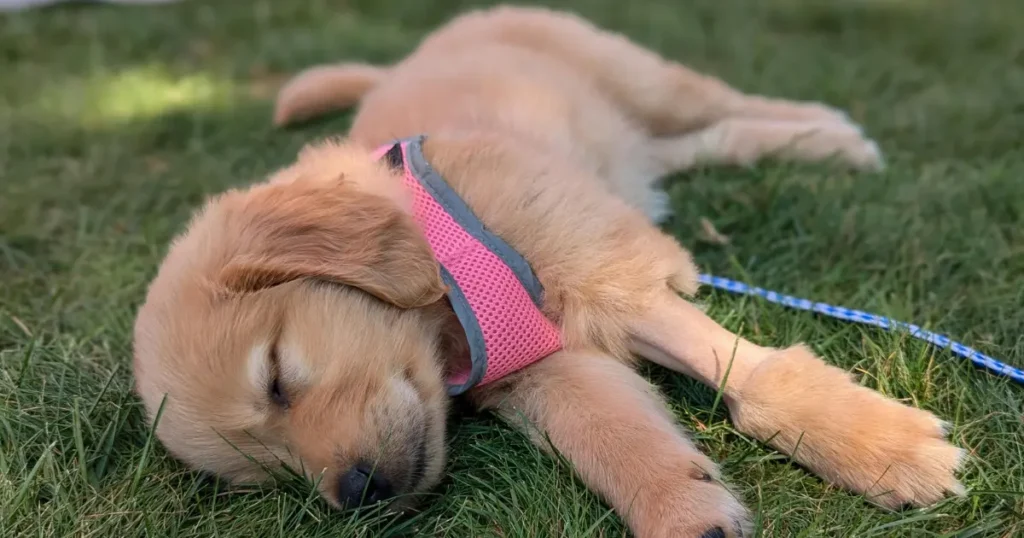
Choosing a golden retriever puppy
When selecting a golden retriever puppy, it’s essential to choose a reputable breeder who prioritizes health and temperament. Look for breeders who provide health clearances for both parent dogs, showing they’ve been screened for common genetic conditions like hip dysplasia.
A healthy golden retriever puppy should be playful, curious, and friendly. Avoid puppies that seem lethargic or overly shy, as this could indicate health or behavioral issues.
Traveling with Your golden retriever puppy
If you plan to travel with your golden retriever puppy, preparation is key. Whether you’re going on a road trip or flying, make sure your puppy has a comfortable space, such as a crate or carrier, and bring along familiar items like toys and blankets.
Travel Tips
When traveling by car, be sure to secure your puppy safely in the backseat. Frequent potty breaks and access to water will keep your golden retriever puppy comfortable during long trips. If flying, check with the airline regarding pet policies and make sure your puppy’s crate meets airline requirements.
Building a Strong Bond
Golden retriever puppies are naturally affectionate and thrive on companionship. By spending quality time with your puppy, you’ll build a strong, lasting bond.
Playtime and Affection
Golden retrievers love spending time with their families, whether it’s through playtime, training sessions, or simply lounging together. The more time you invest in your golden retriever puppy, the stronger your relationship will become.
Conclusion
Raising golden retriever puppies is an incredibly rewarding experience. With their friendly personalities, intelligence, and loyalty, they make perfect companions for families and individuals alike. By following the advice in this guide, you’ll ensure your golden retriever puppy grows into a happy, healthy, and well-behaved dog that brings joy to your life for years to come.
FAQs
How often should I bathe my golden retriever puppy?
Golden retriever puppies should be bathed every two months or as needed, depending on their activity level.
When should I start training my golden retriever puppy?
Training should begin as soon as you bring your golden retriever puppy home, typically around 8 weeks old.
What are common health issues in golden retriever puppies?
Golden retriever puppies can be prone to hip dysplasia, elbow dysplasia, and heart problems. Regular vet checkups can help catch these issues early.
How long does teething last for golden retriever puppies?
Teething typically lasts between 4 to 7 months, during which puppies may chew more than usual.
Can golden retriever puppies be left alone?
Golden retriever puppies do not like being left alone for long periods. It’s best to keep their alone time to a minimum during their early months.



